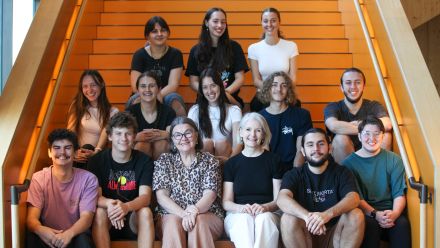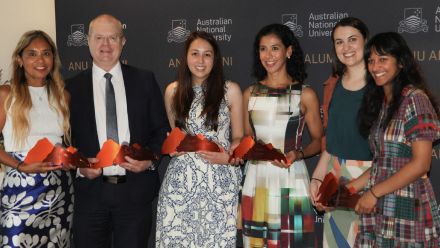Young ANU women fighting for a more equitable world
Updated: Monday 21 March 2022
ANU law student Claudia Hodge is the epitome of this year's International Women's Day theme, 'Changing Climates: Equality today for a sustainable tomorrow'. Claudia is using her voice to highlight the many ways gender equality will help create solutions around climate change, health crises and violent conflicts.
In her position as Youth Co-Chair of the Australian Lawyers for Human Rights Environment and Human Rights Sub-Committee, Claudia is driving change around gender inequality in the face of climate change. She warns that women and girls are facing greater vulnerability and exposure to disasters, crises, and conflicts than men.
"Statistically, women experience higher rates of poverty than men, and therefore face more limited access to climate-resilient housing, healthcare and other resources that allow us to cope in the face of crisis," Claudia says.
Claudia argues society needs to tackle barriers such as lower rates of education among women.
"Without addressing these broader resource and structural constraints associated with gender inequality, women will remain disproportionately affected by disasters, conflicts and other crises," she says.
Creating a "more equal future" for women & girls
For Farkhondeh Akbari, this year's International Women's Day theme strongly resonates with her current research.
"My work contributes to more women's meaningful engagement and involvement in diplomatic practice and research, on conflict resolutions and peace settlements, where women have had the least say but the most effect on their lives," Farkhondeh says.
As a Postdoctoral Research Fellow in gender, peace, and security, Farkhondeh is hopeful that her work will contribute to creating a more equal world for women and girls.
"As a young woman from a minority group belonging to a patriarchal society, unknowingly, my presence, my voice, and my identity can be a positive pathway for many women and girls from a part of the world where gender-based violence and discrimination and elimination are openly practised," she says.
Farkhondeh also emphasises how women working in grassroot movements are fostering real social change in achieving sustainable peace.
"Women enroot peace and equality from within their home and communities, meaningfully contributing to the transition from war to peace," Farkhondeh says.
"Women's participation in peacemaking is vital and directly connected to the sustainability of a peaceful and healthy future."
Collaborative, compassionate & egalitarian leaders
PhD scholar Amy Parry, a Research Fellow at the National Centre for Epidemiology and Population Health, investigates women's leadership in crisis response teams.
She argues that female representation in crisis response teams needs improving. Her research has shown that organisations with a diverse and equitable workforce perform better overall and are more likely to implement policies that focus on families and communities. A recent report on global health leadership found that women comprise 70 per cent of the global health workforce, yet only hold one quarter of senior positions.
Amy says Dr Maria Van Kerkhove, the World Health Organization technical lead of the COVID-19 pandemic, is an inspiration for women in senior leadership positions. She finds Dr Van Kerkhove to be an intelligent, experienced and compassionate leader in her direction of the WHO's COVID-19 response messages.
"My findings have repeatedly indicated the importance of skills such as communication, collaboration, listening and empathy," Amy says.
Women as the threads that hold communities together
Dr Rebecca Colvin, Senior Lecturer with the Resources, Environment and Development Group at the ANU Crawford School of Public Policy, argues that "women and girls can bring new insights and approaches to spaces from which they have traditionally been excluded".
Rebecca sees women and girls as the "threads" that hold communities together through their fostering of social equity, connection and cohesion.
"And this is where we see many women and girls leading new and innovative efforts to imagine and realise a future ghat is sustainable, equitable, and peaceful," she says.


